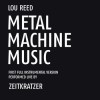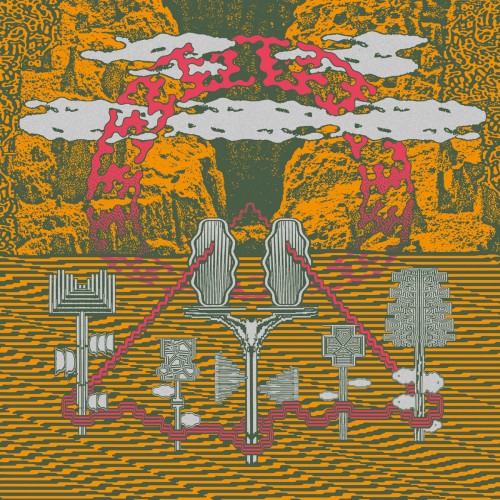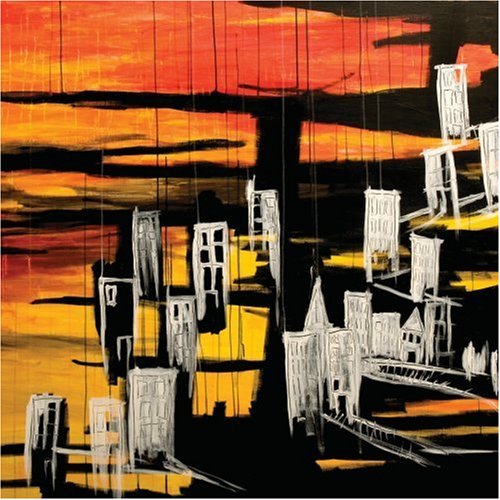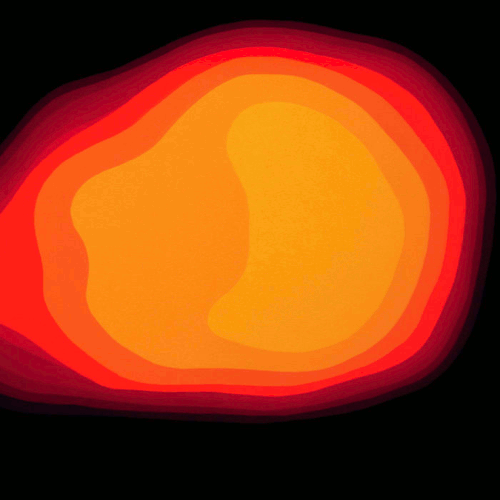Zeitkratzer (CD)/Karl (LP)
 Right then. First thing to say is that this is an awesome achievement. And one that I’ve been waiting to have a proper listen to for a while. Metal Machine Music (MMM) doesn’t, perhaps, stand up as the finest noise/tape collage records, but it does have a high degree of cultural relevance — at least in terms of being a quite unthinkable gesture from a major label artist in 2014. A postcard from a time of excess in the record industry. An excess marked on one side by, y’know, awful sexual politics and criminal misogyny and, on the other, a record like MMM — the sort of preposterous self-indulgence that has merit artistically (I realise other records like this existed and were better, but not with MMM‘s breadth of reach) and the sort of artistic exploration that any label now would run a mile from.
Right then. First thing to say is that this is an awesome achievement. And one that I’ve been waiting to have a proper listen to for a while. Metal Machine Music (MMM) doesn’t, perhaps, stand up as the finest noise/tape collage records, but it does have a high degree of cultural relevance — at least in terms of being a quite unthinkable gesture from a major label artist in 2014. A postcard from a time of excess in the record industry. An excess marked on one side by, y’know, awful sexual politics and criminal misogyny and, on the other, a record like MMM — the sort of preposterous self-indulgence that has merit artistically (I realise other records like this existed and were better, but not with MMM‘s breadth of reach) and the sort of artistic exploration that any label now would run a mile from.
Now. That probably seems unfair, but the reason I say that is because I had to go back to my copy of MMM to check a couple of details in the Zeitkratzer version relative to the original; my copies being a shite German LP re-issue (sans locked-groove on side 4) and a ’90s CD re-issue and, for both, the mix is crap. The HD-labelled version I found on a popular streaming site was crap. Early on in Parts 1 and 2 there’s this curious sound of kettle drums (or other timpani) and some clattering of closed piano lids and those sorts of big bangy noises. Checking those against the original, it turns out that I’d never heard that there’s what sounds like a guitar being dropped/banged against an amp — the sort of detail that actually forms a sort of narrative to those sides, or at least gives it an opener. The suspicion I have isn’t so much that Reed didn’t intend that, but it’s been buried for a while in the shoddy mixing/mastering. These Zeirkrazer folk have done a sterling job of picking out details to MMM that were nothing like apparent in the “canonical” released version – though it could be the case that the very first issue of MMM was mixed slightly better; I’ve no idea.
The next thing then, is a bit of a question about interpretation, and how you interpret a record like this. I’m not sure if there’s a score that Reed worked from and late interviews with him stated that Zeitkratzer transcribed it, so we know what happened with this record, but not so much what happened with the original. With any transcription beyond simple diatonic melodies — and certainly for a transcription of a tape collage dense with layers — there’s a question not of “how to make it exactly the same as the original” but of how to preserve the spirit of the original with judicious compromise. And yeah, MMM does deserve to be taken seriously in that way. Illustrating this, around the 11 minute mark of Zeitkratzer’s transcription we have high pitched piano and wind chimes. It’s tricky to pin down what this represents in Reed’s original — I’m thinking that it’s the phased whistle tone feedback, but it could as easily be a pitching up of some other element. That isn’t to say that Zeitkratzer haven’t “faithfully” covered the original, but that there is a degree of interpretation necessary in order to produce something like this. There’s a couple of elements of transparent consistency in Reed’s MMM — long feedback tones and those phased notes. The feedback tones are largely carried by the nearest timbre — meaning it’s sometimes in massed brass, sometimes in cellos, sometimes in higher-pitched instruments. The phased notes are largely represented in a fairly simple (and likely, ensemble orienting) sawed crotchets — meaning that some of the violinists spend most of the piece just going back and forth on one note, which makes theirs the durational crown.This idea of interpretation is pretty key — there are definitely moments where I felt there was almost too much music from Zeitkratzer’s perspective — early on in Part 4 has arguably a bit much in the way of melodic pianism, and Part 2 has some strange interpolations of melodicism towards the end. But that’s pretty disingenuous — this is definitely a transcription-cum-interpretation and finding small areas of melodicism is just making the material available work for the ensemble. I wasn’t initially convinced by the ways of representing the phase effect but, going back to the original, I really couldn’t conceive of any other way to do it. These versions are slightly longer than the originals, and feel a degree slower, but this is definitely MMM — perhaps, arguably, as it should’ve sounded in the first place.
To be honest with you, I really hadn’t expected to give this record as much of a listen as I did — MMM the original is a record I know fairly well but I haven’t listened to it that closely for a while. It’s a record I like but I wouldn’t have imagined being too bothered if I never listened to it again. So the plaudits to Zeitkratzer are definitely due — they’ve managed to retrieve a record from a template hopelessly mired by (what I’m now seeing as) a dreadful mix. I’d say that it’s probably going to be lost on you if you’re not familiar with the original but as a means of restitution for Saint Lou’s great indulgence, this is about as much veneration as you’ll need. So Zeitkratzer + Keiji Haino seems to be a composition by the ‘kratzer’s Reinhold Friedl with Keiji Haino singing on it. The notion that anyone could pin down Haino to anything so terrestrial as a score seems pretty far-fetched, so I’m going to work on the assumption that it’s a fully-composed piece with Haino improvising vocals. Opener “Ghosts” is pretty emblematic — Haino going well into his acidic falsetto for the the intro, dipping well into his lower register overtone towards the 3/4s mark. Meanwhile, Zeitkratzer scrape around a sustained pulse, lots of what sounds like bowed cymbals and (George Crumbs) Black Angels-esque frittering high strings. Odd that it’d take a contemporary ensemble to do the longest sustained, articulated pulse I’ve heard Haino work against since… God knows actually; he’s not one for regular pulses.
So Zeitkratzer + Keiji Haino seems to be a composition by the ‘kratzer’s Reinhold Friedl with Keiji Haino singing on it. The notion that anyone could pin down Haino to anything so terrestrial as a score seems pretty far-fetched, so I’m going to work on the assumption that it’s a fully-composed piece with Haino improvising vocals. Opener “Ghosts” is pretty emblematic — Haino going well into his acidic falsetto for the the intro, dipping well into his lower register overtone towards the 3/4s mark. Meanwhile, Zeitkratzer scrape around a sustained pulse, lots of what sounds like bowed cymbals and (George Crumbs) Black Angels-esque frittering high strings. Odd that it’d take a contemporary ensemble to do the longest sustained, articulated pulse I’ve heard Haino work against since… God knows actually; he’s not one for regular pulses.
Yeah, OK, so here’s a thing – I’ve got somewhere in the region of 40 Haino CDs (no bloody LPs, sadly) and I increasingly struggle to listen to much of them. Not that he’s not one of my favourites ever, just that it’s an increasing struggle to think of a time when I’ll listen to most of them again. So there’s a question, always, with people with towering back catalogues, as to what sets this apart. On that front, it’s Haino working with a contemporary ensemble and it seems to be improv against composition. Zeitkratzer are amazing and the pieces are very much of a super-extended technique sort, plenty of sounds on the perimeters of musicianly control. Ultimately, I suspect this is probably a piece for folk who like contemporary composition but aren’t terribly au fait with it but quite like Japan’s finest musician. It might seem disingenuous, but it’s kind of tricky venerating anything particular in Haino’s catalogue except by vague contingencies — everything he does is outstanding, and this is a grand exposition of his formidable voice but, uh, there’s a few of those about. He’s not worked with any musicians this close to this type of virtuosity before (I mean, the kind of regimented control a formally trained musician has) but from the Haino perspective, it’s business as usual. Business is always good with him though.
Maybe what I’m saying is that the pieces with a regular pulse against which Haino plays are sort of missing a trick — the long and densely brooding “Roses” works something like Toshio Hosokawa‘s Landscapes, with Haino finding pitches to match with his insane range. “Birdy,” with its contrasting birds motifs in multiple registers and timbres over a grinding klaxon in the strings, figures Haino’s voice with something to go against, and work on. He’ll play over anyone, so where this record really works is when Zeitkratzer give Haino something far less regular, more textural and peculiar, to fight with, rather than playing the supporting role.Yeah. So it’s a good record, right? Just difficult to place in Haino’s œuvre. You should probably buy it, you’ve not bought a Haino record for a while. Treat yourself, it’s nearly (shudder) Christmas.
-Kev Nickells-



